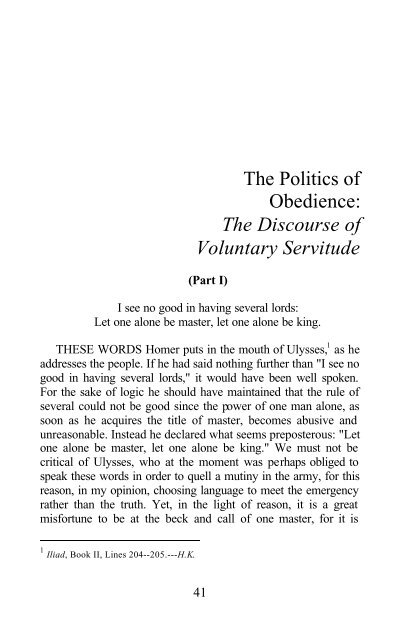You also want an ePaper? Increase the reach of your titles
YUMPU automatically turns print PDFs into web optimized ePapers that Google loves.
The <strong>Politics</strong> <strong>of</strong><br />
<strong>Obedience</strong>:<br />
The Discourse <strong>of</strong><br />
Voluntary Servitude<br />
(Part I)<br />
I see no good in having several lords:<br />
Let one alone be master, let one alone be king.<br />
THESE WORDS Homer puts in the mouth <strong>of</strong> Ulysses, 1 as he<br />
addresses the people. If he had said nothing further than "I see no<br />
good in having several lords," it would have been well spoken.<br />
For the sake <strong>of</strong> logic he should have maintained that the rule <strong>of</strong><br />
several could not be good since the power <strong>of</strong> one man alone, as<br />
soon as he acquires the title <strong>of</strong> master, becomes abusive and<br />
unreasonable. Instead he declared what seems preposterous: "Let<br />
one alone be master, let one alone be king." We must not be<br />
critical <strong>of</strong> Ulysses, who at the moment was perhaps obliged to<br />
speak these words in order to quell a mutiny in the army, for this<br />
reason, in my opinion, choosing language to meet the emergency<br />
rather than the truth. Yet, in the light <strong>of</strong> reason, it is a great<br />
misfortune to be at the beck and call <strong>of</strong> one master, for it is<br />
1 Iliad, Book II, Lines 204--205.---H.K.<br />
41


